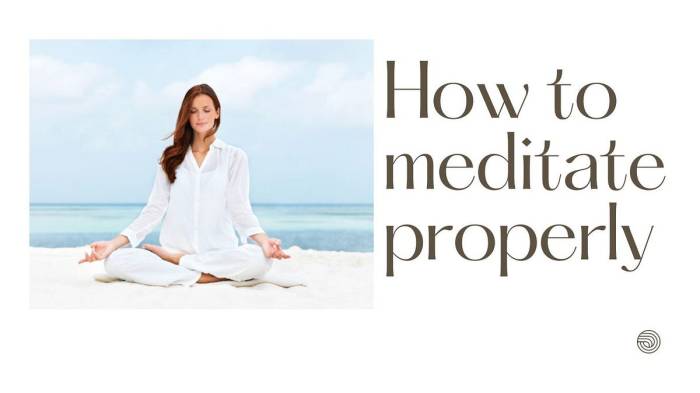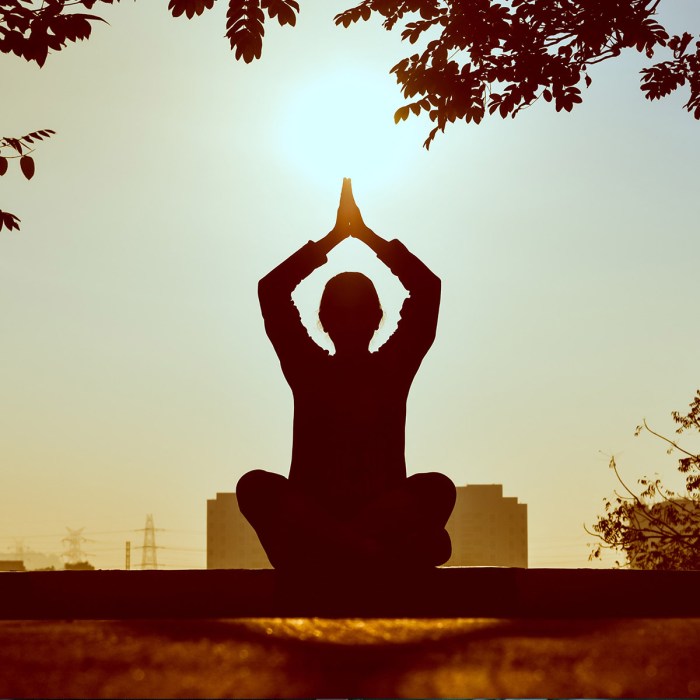How to Meditate for Building a Strong Foundation of Peace sets the stage for a journey towards inner tranquility and emotional stability. Delve into the realms of meditation as we explore the path to cultivating peace within oneself.
Discover the transformative power of different meditation practices and learn how to overcome challenges to establish a consistent routine for lasting serenity.
Introduction to Meditation for Building Peace

Meditation is a practice that involves focusing the mind and eliminating distractions to achieve a state of mental clarity and emotional calmness. It has been used for centuries to promote relaxation, reduce stress, and cultivate inner peace.
To build mental resilience, meditation is key. By following How to Meditate to Build Mental Resilience , you can strengthen your mind and overcome challenges with ease. These techniques will help you develop a positive mindset and face adversity with confidence, allowing you to navigate life’s ups and downs with grace.
By incorporating meditation into your daily routine, you can experience a wide range of benefits that contribute to building a strong foundation of peace. Meditation helps in developing self-awareness, improving concentration, and enhancing emotional well-being.
The Power of Meditation in Cultivating Peaceful Mind
- Meditation allows you to observe your thoughts and emotions without judgment, leading to a greater sense of inner peace and tranquility.
- Regular practice of meditation can help in reducing anxiety, depression, and overall stress levels, creating a harmonious balance between mind, body, and spirit.
- Through meditation, you can cultivate a positive outlook on life, increase feelings of compassion and empathy towards yourself and others, fostering a peaceful mindset in various aspects of your daily life.
Types of Meditation Practices for Inner Peace

In the journey towards building a strong foundation of peace, various types of meditation practices can be beneficial. Let’s explore three different types of meditation that can contribute to inner peace and emotional resilience.
Mindfulness Meditation, How to Meditate for Building a Strong Foundation of Peace
Mindfulness meditation involves focusing on the present moment without judgment. This practice helps individuals become more aware of their thoughts, emotions, and sensations, leading to a sense of calm and clarity. By cultivating mindfulness, individuals can better manage stress, anxiety, and negative emotions, ultimately fostering inner peace and emotional balance.
Searching for purpose and meaning in life? Look no further than meditation. By incorporating How to Meditate for Finding Purpose and Meaning in Life into your daily routine, you can gain clarity and direction. This practice can help you connect with your inner self and uncover the path that aligns with your true purpose.
Loving-Kindness Meditation
Loving-kindness meditation, also known as Metta meditation, involves directing feelings of love, compassion, and kindness towards oneself and others. This practice helps individuals cultivate positive emotions and empathy, leading to a greater sense of connection and peace. By fostering feelings of goodwill and acceptance, loving-kindness meditation can enhance emotional resilience and promote harmony within oneself and with others.
Transcendental Meditation
Transcendental meditation is a technique that involves silently repeating a mantra to achieve a state of relaxed awareness. This practice allows individuals to transcend ordinary thinking and experience a deep sense of inner peace and tranquility. By accessing a state of profound rest and relaxation, transcendental meditation can help reduce stress, improve mental clarity, and promote emotional well-being.Each of these meditation practices offers a unique approach to cultivating inner peace and emotional resilience.
By incorporating mindfulness, loving-kindness, or transcendental meditation into your daily routine, you can build a strong foundation of peace that supports your overall well-being and fosters a sense of harmony within yourself and the world around you.
Steps to Start Meditating for Peace: How To Meditate For Building A Strong Foundation Of Peace

To begin a meditation practice for cultivating peace, follow these step-by-step guidelines:
Finding a Quiet and Comfortable Space
It is essential to find a quiet and comfortable space where you can meditate without distractions. Choose a peaceful corner in your home or a serene outdoor location.
Focus on the Breath, Thoughts, or Mantras
During meditation sessions, you can focus on your breath by observing the inhalation and exhalation. Alternatively, you can choose to focus on calming thoughts or repeat a mantra to quiet the mind.
When it comes to relieving stress, meditation can be a powerful tool. By practicing How to Meditate for Stress Relief: 7 Effective Techniques , you can calm your mind and restore balance in your life. These techniques are easy to learn and can be practiced anywhere, making them perfect for busy individuals looking for a moment of peace.
Benefits of Regular Meditation Practice

Regular meditation practice offers numerous long-term benefits for mental and emotional well-being. Consistent meditation can have a profound impact on reducing stress, anxiety, and promoting a sense of calm in individuals.
Reduction of Stress and Anxiety
- Meditation helps in calming the mind and relaxing the body, which in turn reduces the levels of stress and anxiety.
- By focusing on the present moment through meditation, individuals can let go of worries about the past or future, leading to a more peaceful state of mind.
- Regular meditation practice can also lower the production of stress hormones in the body, further aiding in the reduction of anxiety and tension.
Improved Concentration and Self-Awareness
- Through meditation, individuals can enhance their ability to concentrate by training the mind to focus and avoid distractions.
- Increased self-awareness is another benefit of regular meditation practice, as individuals become more attuned to their thoughts, emotions, and reactions.
- By developing a deeper understanding of oneself through meditation, individuals can make better choices and decisions in various aspects of life.
Enhanced Overall Quality of Life
- Meditation can lead to a greater sense of inner peace and contentment, contributing to an overall improved quality of life.
- Individuals who meditate regularly often report better relationships, improved sleep, and a more positive outlook on life.
- By cultivating a daily meditation practice, individuals can experience a profound sense of well-being that extends beyond their meditation sessions.
Overcoming Challenges in Meditation for Peace

Meditation is a powerful tool for cultivating inner peace, but beginners often face challenges when trying to establish a consistent practice. These obstacles can include restlessness, distractions, and a lack of motivation. Overcoming these challenges is crucial for building a strong foundation of peace through meditation.
Strategies to Overcome Challenges
- Acknowledge and accept distractions: Instead of fighting against distractions, acknowledge them without judgment and gently guide your focus back to your breath or mantra.
- Set realistic goals: Start with shorter meditation sessions and gradually increase the duration as you build your practice. Setting achievable goals can help maintain motivation.
- Create a dedicated space: Designate a quiet and comfortable space for your meditation practice to minimize external distractions and signal to your mind that it’s time for inner peace.
- Experiment with different techniques: If you find traditional seated meditation challenging, explore other forms of meditation such as walking meditation or guided visualization to find what works best for you.
Techniques for Commitment and Integration
- Establish a routine: Schedule your meditation practice at the same time each day to create a habit and make it easier to stick to your commitment.
- Start small: Even a few minutes of meditation can have a significant impact. Begin with short sessions and gradually increase the duration as you become more comfortable.
- Practice mindfulness: Bring the awareness and presence cultivated during meditation into your daily activities. Mindful eating, walking, and breathing can help you stay connected to the peace within you.
- Find a supportive community: Join a meditation group or online community to connect with like-minded individuals who can offer encouragement, accountability, and guidance on your meditation journey.
Embark on your meditation journey armed with the knowledge of building a strong foundation of peace. Let the practice of meditation guide you towards a life filled with calmness, clarity, and emotional well-being.